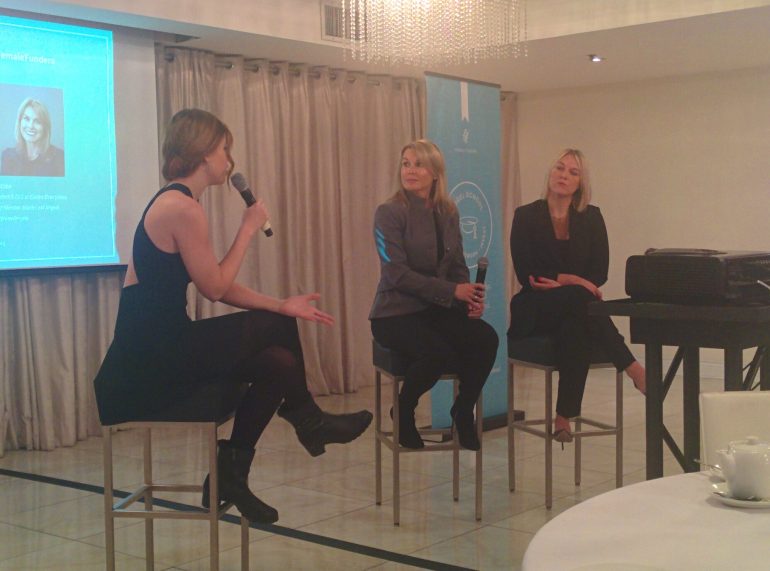Kicking off an eight-city event in Toronto, Katherine Hague stood before a full room of female investors — both active and aspiring — to present what she calls her “passion project that spiraled out of control.”
“I’m a huge believer of investing in people. I found that to be a good strategy.”
– Edel Ebbs, president and CEO at Electra Enterprises
For the next few weeks, Hague is making stops in cities across North America to host the Female Funders Breakfast Series as part of her mission to help 1,000 women pursue angel investing. Hague, who has made angel investments in companies like Bridgit, said that her experience set the course for her to eventually found Female Funders; out of 70 angel investors in CareGuide’s angel round, Hague said that only two were female.
“It really sort of set me on a mission to figure out why this was happening,” she said. “I started talking to women about why they’re investing or not investing, and I eventually went down to Stanford for a two-week program with 500 Startups on venture capital and angel investing. I was inspired to try to tell women’s stories of how they got into this to make it more relatable to other women in the space, and to realize you don’t have to start with massive cheques and you don’t need to know everything about the venture world.”
To help women pursue angel investing, Female Funders offers a six-week Angel School for accredited investors, which allows participants to work on a flexible schedule for four hours a week. The program is meant to provide the fundamentals of angel investing, like due diligence processes, deal structures, developing a thesis and portfolio strategy, and provides access to a network of experts. Female Funders also has live Expert Hours for the community to ask questions of industry experts, including angel investor Arielle Zuckerberg, 500 Startups managing partner Bedy Yang, and 500px CEO Andy Yang.
So many amazing women have attended the #Femalefunders Ottawa event! #FundersBreakfastOtt pic.twitter.com/61b74BdUit
— Female Funders (@FemaleFunders) January 20, 2016
After making every single attendee introduce themselves with three words or phrases to describe them and which industries they’re interested in, Hague finished off with a casual Q&A with OMX founder and Next Gen Den dragon, Nicole Verkindt, and Electra Enterprises founder and CEO Edel Ebbs, who is now turning to angel investing.
“I feel very fortunate for the opportunities that I’ve had, and I feel that I just need to give back,” Ebbs said. “I find it very energizing to work with entrepreneurs from the dark days of corporate. What kept me going was knowing that there was a future where I could do something like this and connect me to my roots working with early stage companies.”
Such a pleasure to speak this AM on behalf of #Shopify at the @FemaleFunders Toronto Breakfast | #FemaleFunders pic.twitter.com/cT6NqMQ2Hi
— Katie Hudson (@kt_hudson) January 19, 2016
Hague noted that only 2.7 percent of venture capital funding goes to female CEOs, a finding from a 2014 study that looked at 6,793 companies in the U.S. A common issue raised from both female VCs and entrepreneurs interviewed in the study were the lack of access to valuable networks, which are mostly male dominated. It was telling that Verkindt herself echoed the importance of networks, as Female Funders is especially dedicated to helping women access networks from fellow female entrepreneurs and investors who understand what it’s like to be a woman trying to raise money. Verkindt said that going to networking events like Female Funders was valuable in helping her raise money. “I had no tech startup background, I only had domain expertise. Within six to eight months we raised money from strictly angels and we got follow-on government funding. I did that just through networking.”
The speakers warned aspiring investors that angel investing is tough because early stage investments can be so unpredictable — Hague said that there’s a 90 percent chance of failure, and a 10 to 20 company portfolio over two to three years, putting the same amount of money in each company, is a safer portfolio. But they all agreed that when looking to invest, it’s important to invest in the team, rather than the company itself, since the latter is always changing.
“I’m a huge believer of investing in people,” said Ebbs. “I found that to be a good strategy, so looking at their track record, knowing them, and seeing if they understand the world the way you do. You do have to balance it.”
Verkindt added that all of her investments have been in the early seed stage — an experience she understands well, as her friend invested $5,000 in her company as it was about to run out of money because he believed in her. “The market is going to change, and I’ve lived that. It’s mostly about the team, because it will just change and pivot throughout.”


